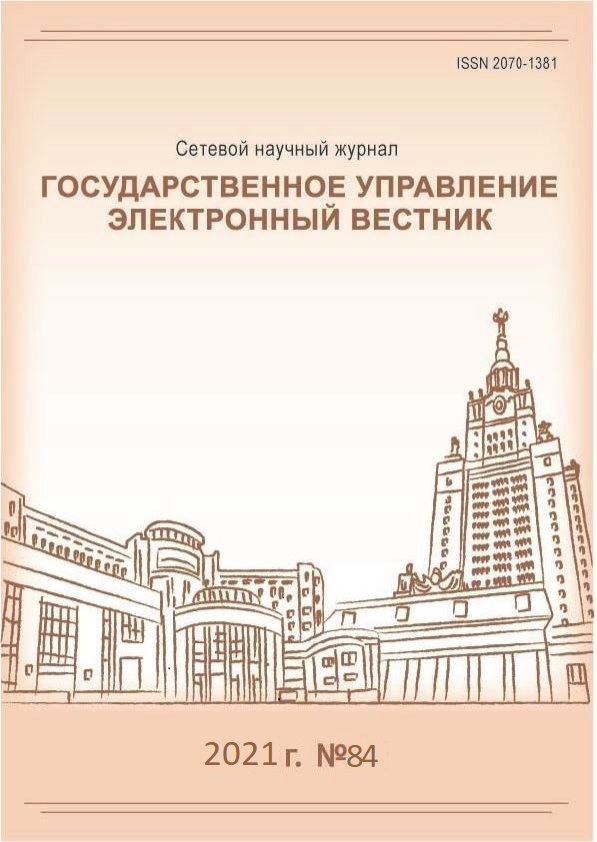Principles of Forming Digital Ecosystem of Process Management Based on Business Model
Keywords:
Business model, digital economy, digital enterprise, ecosystem, innovation, project management, resource planning, transformationAbstract
The changes taking place in the economy in recent decades are directly related to Industry 4.0 (Industry 4.0) or the so-called Fourth industrial revolution. It is not disputed that the further socio-economic development of society will be based on digital technologies, and the economy itself will strive for maximum digitalization. In this regard, the search for forms, methods and ways of the most rational (revolutionary or evolutionary) transformation of economic entities (enterprises of various forms of ownership) seems appropriate and relevant. The article discusses the issues of enterprises digital transformation, the basis and key to the success of which is the creation of a single information space (IT ecosystem). The conditions under which it is advisable to carry out digital transformation are considered and a justification is given for the need for its practical implementation only in the presence of a new business model that describes in detail the processes and rules of interaction between the enterprise and consumers, which determines the means and methods of communication. It is shown that the basis of the business model is the digital twins of objects and processes, which allow planning, forecasting, monitoring and managing events with a given accuracy. The understanding is given that digital transformation provides a significant increase in productivity and efficiency by closing the loop «efficiency — reliability — safety — management» of business processes of production, operational and commercial activities within the new business model of a digital enterprise. In the conclusion recommendations are given for the formation of a business process management system.
References
Бабич О.В., Митюченко Л.С., Игольникова И.В., Чернышова И.Г. Трансформация процесса управления предприятием в рамках становления цифровой экономики. Курск: Университетская книга, 2019.
Бодрунов С.Д. Реиндустриализация в условиях новой технологической революции: дорога в будущее // Управленец. 2019. Т. 10. № 5. С. 2–8. DOI: 10.29141/2218-5003-2019-10-5-1.
Васин Н.С. Управление устойчивостью предприятия в условиях цифровой экономики // Экономический анализ: теория и практика. 2018. Т. 17. № 6. С. 1100–1113. DOI: https://doi.org/10.24891/ea.17.6.1100.
Дудихин В.В., Шевцова И.В. Умное управление — управление с использованием искусственного интеллекта // Государственное управление. Электронный вестник. 2020. № 81. С. 49–65. DOI: 10.24411/2070-1381-2020-10078.
Ильин И.В., Лёвина А.И., Дубгорн А.С. Цифровая трансформация как фактор формирования архитектуры и ИТ-архитектуры предприятия // Научный журнал НИУ ИТМО. Серия: Экономика и экологический менеджмент. 2019. № 3. С. 50–55. DOI: 10.17586/2310-1172-2019-12-3-50-55.
Исаева А.Э., Петрунин Ю.Ю., Пурлик В.М. Критическое осмысление концептуальных подходов к анализу бизнес-моделей // Вестник Московского университета. Серия 21. Управление (государство и общество). 2020. № 1. С. 3–21.
Овчинникова О.П., Харламов М.М., Кокуйцева Т.В. Методические подходы к повышению эффективности управления процессами цифровой трансформации на промышленных предприятиях // Креативная экономика. 2020. Т. 14. № 7. С. 1279–1290. DOI: 10.18334/ce.14.7.110615.
Пинчук В.Н., Журавлев Д.М. Предприятие. Технологии и экономика цифровой трансформации. Новосибирск: Академиздат, 2020.
Слепцова Ю.А., Качалов Р.М. Интеграционная стратегия предприятия в условиях цифровой трансформации экономики // Научно-технические ведомости Санкт-Петербургского государственного политехнического университета. Экономические науки. 2018. Т. 11. № 5. С. 7–21. DOI: 10.18721/JE.11501.
Тарасов И.В. Подходы к формированию стратегической программы цифровой трансформации предприятия // Стратегические решения и риск-менеджмент. 2019. Т. 10. № 2. С. 182–191. DOI: https://doi.org/10.17747/2618-947X-2019-2-182-190.
Флек М.Б., Угнич Е.А. Управление предприятием в условиях цифровой трансформации. Ростов-на-Дону: Донской государственный технический университет, 2020.
Чаадаева В.В. Целевая модель предприятия коммунального сектора экономики: разработка и управление бизнес-процессами // Экономические и гуманитарные науки. 2016. № 2. С. 106–113.
Шестопалов А.Д. Инновационные технологии — основной драйвер трансформации промышленного сектора экономики // Московский экономический журнал. 2019. № 11. С. 287–291. DOI: 10.24411/2413-046Х-2019-10117.
Downloads
Published
Similar Articles
- Ivan A. Titov, Alla Z. Bobyleva, Transformation of Ecosystems’ Role in the Context of Current Conditions of Digital Economy Development in Russia , Public Administration. E-journal (Russia): No. 98 (2023)
- Zhang Jianhua, Innovation Research on Digital Transformation of Manufacturing Industry in China and Russia in the Digital Economy Era , Public Administration. E-journal (Russia): No. 110 (2025)
- Igor S. Kalganov, Features of Innovation Processes in Public Administration Sector in Conditions of Digital Transformation of Russian Economy , Public Administration. E-journal (Russia): No. 102 (2024)
- Elena N. Veduta, Liparit A. Gegamyan, Artificial Intelligence in Ensuring Sustainable Economic Development , Public Administration. E-journal (Russia): No. 110 (2025)
- Aigul E. Isaeva, Aleksandr S. Voronov, Business Ecosystem and Its Impact on Public Administration of Business Activities: Theoretical Overview of the Subject Area , Public Administration. E-journal (Russia): No. 97 (2023)
- Larisa V. Lapidus, Role of Technological Innovations in Business Development and Digital Transformation in Eurasian Economic Union Countries , Public Administration. E-journal (Russia): No. 95 (2022)
- Alexander A. Kovalenko, Developing the Model of Social Controlling of Enterprise’s Innovative Activity , Public Administration. E-journal (Russia): No. 111 (2025)
- Natalia P. Ivashchenko, Vera G. Popova, Konstantin S. Sadov, On the Issue of Criteria for Innovativeness of Business Models of Pre-University Education , Public Administration. E-journal (Russia): No. 102 (2024)
- Elmira Sh. Shaimieva, Guzel I. Gumerova, Elvina R. Gareeva, A Lean Startup to Increase the Competitiveness of Russian Universities: Organizational and Managerial Aspects of Applied Results , Public Administration. E-journal (Russia): No. 111 (2025)
- Ekaterina A. Panova, The Impact of Digitalization on Corporate Human Resources Policy , Public Administration. E-journal (Russia): No. 101 (2023)
You may also start an advanced similarity search for this article.




